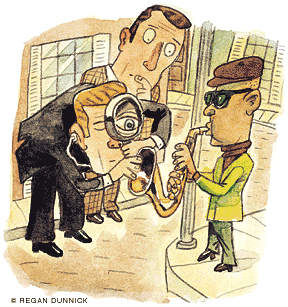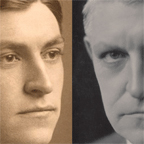
It was purely by accident that John Sopko C’74 discovered that New Orleans had been nuked. (All right, so there was a healthy dollop of skeptical intuition at work, too—that’s not exactly a liability in his business.) The year was 1995, and Sopko—then working as deputy counsel and chief investigator for the Senate Permanent Subcommittee on Investigations chaired by Senator Sam Nunn—had just turned on his TV. A news story described an exercise in October 1994 called Mirage Gold, in which the federal Nuclear Emergency Security Team (NEST) played out a five-day scenario wherein a fictitious militia group threatened to explode a nuclear bomb in New Orleans.
The news story “praised how excellent the exercise turned out, how the NEST team successfully found and deactivated a dummy nuclear device that was supposed to have been hidden in New Orleans,” Sopko recalled in a recent e-mail interview. “There was just something strange about the press piece and how it was presented that made me suspicious. Since we were then looking at preparedness issues, I decided to look into this as a good case study on how prepared we were to handle such an incident.”
The answer was: We weren’t.
“The end result was that ‘we lost New Orleans,’” says Sopko. “What I finally found out, by demanding to see all of the after-action reports filed by the various federal agencies and interviewing a number of the participants, was that this exercise was a total disaster—that the NEST team failed to find the device, failed to successfully defuse it in the allotted time, and that the federal response was totally disorganized and ineffective. One general told me that if it had been a real event, his men would have lined up the FBI agents and shot them because they were getting in the way.”
Sopko will have plenty of opportunity to probe the nation’s anti-terrorism defenses in the coming months. This past October, he was appointed general counsel and chief of investigations for the Democratic staff of the House Select Committee on Homeland Security. His comments on the subject are pretty measured, even though Congressional Quarterly recently described him as the “Democrats’ new attack dog on Homeland Security.”
The Homeland Security Act was the “biggest restructuring of the government since the creation of the Department of Defense,” he says, and while he acknowledges that it has improved security since 9-11, “the more important question which has not been answered yes is, ‘Are we as safe as we need to be?’”
The committee recently issued a 135-page report titled America at Risk: Closing the Security Gap. Its conclusions? “Our nation remains vulnerable to catastrophic attacks involving nuclear, biological, chemical, and radiological weapons. Pathways to the United States by land, sea, and air are insecure. Our critical infrastructures have few defenses and our communities are not as prepared as they need to be to respond to a terrorist attack. We need to take faster and stronger action to close these security gaps.” (See www.house .gov/hsc/democrats/ for more on the committee’s findings.)
Sopko’s interest in crime issues goes back to his childhood in the Wilkes-Barre region of northeastern Pennsylvania. His Polish and Italian immigrant parents instilled in him “strong values about helping the working class,” and some of his earliest heroes were union leaders like John L. Lewis of the United Mine Workers. After graduating from Penn, he set his sights on working in the organized-crime section of the Department of Justice.
He got his start in Cleveland, where in 1979 (at the ripe old age of 27), he was the lead prosecutor in U.S. vs. Licavoli, et al, then the “biggest case we had in the FBI-Justice Department’s inventory.” He was the first federal prosecutor to use the Racketeering Influence and Corrupt Organizations (RICO) laws to convict the entire hierarchy of a Mafia family.
In 1982, Sopko went from the Mob to the Hill, where he was hired by Sam Nunn and ended up staying for 15 years. His investigations ranged from organized crime to narcotics trafficking in Latin America (he led three separate staff delegations to Peru, Bolivia, and Colombia) to fraud
(insurance, health-care, federal student-aid), to labor racketeering, arms trafficking, and finally to counter-espionage and the proliferation of weapons of mass destruction.
Shortly after the trial run of Mirage Gold, the name Aum Shinrikyo appeared on his radar screen. Sopko was in a classified briefing about the Kurchatov Institute, Russia’s main nuclear-weapons-production facility, when a briefer from the Defense Intelligence Agency told him that there were “Aum members working there.” Sopko had never heard of Aum, but in March 1995, Aum released a cloud of sarin gas in a Tokyo subway station, killing 12 people and injuring thousands.
To learn more about the deadly cult, Sopko and his colleagues on the subcommittee traveled to Japan, Russia, Ukraine, and Germany—not to mention New York, where Aum had once had an office. It turned out that U.S. intelligence agencies had pretty much missed the rise of Aum, which Sopko describes as “Buddha meets Dr. Strangelove.”
“We didn’t know anything about them even though they were talking about killing Americans and starting the great war in the press in Japan,” Sopko told CQ.
Aum’s Tokyo attack was, in a sense, a precursor to the September 11 World Trade Center attacks—which Sopko had anticipated in an article for Foreign Policy in Winter 1996/97 titled “21st Century Security: The Changing Proliferation Threat.”
“I ran a three-year-long investigation into the new national-security landscape that lasted approximately three years,” he recalls. “I put on a series of hearings for Nunn in 1995 and 1996 on [Aum Shinrikyo] and other threats from the new terrorist [organizations] and their ability to launch catastrophic attacks on the United States.” Forty-seven witnesses testified, he notes, “and more than one predicted a catastrophic attack.”
Sopko and his colleagues helped shape the 1996 Weapons of Mass Destruction Act, which became law as part of the 1997 Defense Authorization Act.
If Sopko has a remarkably broad range of crime-fighting experience, it’s still the process that he enjoys most.
“Like most investigators, I think I love the chase more than anything,” he says. “It is putting the pieces of a puzzle together and making the case for what ultimately will result in policy changes.”
—S.H.




